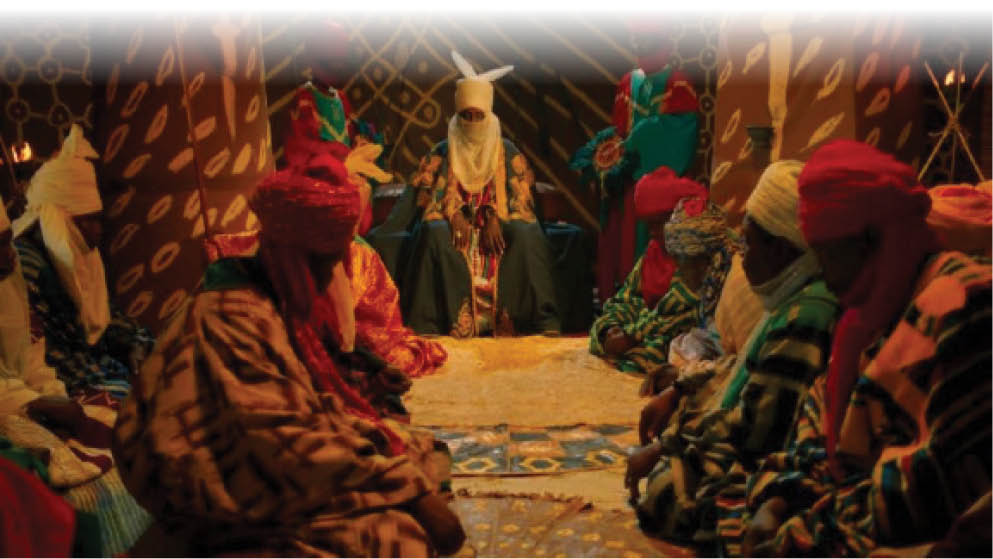Despite the proliferation of contents from the northern part of the country, the main creative industry – Kannywood – has failed to meet up with contemporary global trend in filmmaking.
Weekend Trust reports that Kannywood, the mainstay of northern Nigeria’s entertainment industry, is still struggling to be properly structured.
It is, therefore, as a way of scaling up, that the most expensive film in Kannywood, Mai Martaba, was shot and unveiled.
The film, premised on an unending royal battle, shapes and represents the culture and tradition of the royal setting in Hausa land, and by extension, other tribes who share similar royal features in Nigeria and Africa in general. On the run through, the plot interrogates the status quo as a female emir is billed to take over the throne of her father, a development which gave birth to crisis.
- Largest diamond in over a century discovered in Botswana
- Inside cemeteries of colonial masters, missionaries
Speaking shortly after the premiere of the film, the producer and director, Prince Daniel, popularly known as Aboki, said it was set to redefine and expand the creative industry in the North.
He said, “If you look at the creative or movie landscape in Nigeria, you would find out that conspicuously, the North and its contents are missing. Between 2016 and 2022, what Netflix spent in Nigeria, Kenya and South Africa, was about $175 million, but not a dime came to the North because there is no structured industry.
“The industry in the North has not been able to compete with the trend of modern filmmaking, technically, so, that made us think there’s need to scale up; and that’s what we did. We thought to scale up production in terms of value and equipment because we know that in the creative value chain of film production, there is so much money to be made for young people. In a film like Mai Martaba, we worked with cast and crew of close to 500, so, even if you are paying each person N1,000 it is a lot of money.
“We wanted to push our production to compete with any other in Nigeria and even outside the country. And we are glad that in the week we released Mai Martaba, it got selection to one of the biggest festivals in Amsterdam, Europe.
“So, we are pushing the Hausa content. We are pushing the actors and the crew to consolidate on what Kannywood already has.”
Daniel added that the challenges bedevilling the creative industry in the North, filmmaking especially are; lack of ownership, belief and patience.
He said, “People in the North don’t even believe in the industry, so every dime you spend will have to be your hard-earned money. Nobody invested a kobo in the production; but we are glad that nobody invested their money because they might not have the patience to wait for the gestation of the film. This film has been in the mill for two years and six months, from shooting to post production. We were working round the clock; so if it was somebody else’s money, you won’t be able to sleep. And it seems like it is an industry they don’t even understand, so funding is a critical problem.
“It is the most expensive Hausa film ever shot. An aspect of the production like equipment alone to rent was over N25 million. We are not taking about the cars and accommodation; and we had to move everybody to Daura in Katsina State. We brought in crew and equipment from Lagos, because in the North, we hardly have high tech equipment.
“We filmed Mai Martaba on ARIN – the highest equipment for now; you can’t find it anywhere in the North, not even Abuja, so you must rent it from Lagos. Then, we brought in handlers; and the special effect make-up guy had to come from Imo State because again, there is capacity gap. The challenges are enormous, such that if you begin to list them you might not even do the film.
“The message to the North is that it is a bit tricky, in the sense that averagely, in the North, people don’t want to take loans because it comes with interest. Even during the last administration, there was so much money for the creative industry in the Bank of Industry, where you could access as much loan as you wanted.
“People who do cinemas can think of as much as N500 million, and it is a single digit interest. Even the moratorium is supposed to be two years because the loan is 10 years, but nobody in the North accessed it; some for the reasons are that it would come with interest, documentation, as they might not be able to have all that is needed in paper work.
“Most of the people who do big films in Lagos have access to the Bank of Industry facility. And now, at the iDICE under the Office of the Vice President, there is $617 million, but what comes to the North is left for the region to decide if they can tap into the resources.
“Even the Minister of Arts, Culture and Creative Economy, Hannatu Musawa, has talked about the projection of the creative industry. She is looking at a N100 billion. There is money, but how do you tap into the money? To be honest, there is money, but how much comes to the North?”
Speaking further about the initiative, Daniel revealed that the entire film was shot with almost 100 per cent new actors, with the exception of a single known celebrity from Kannywood.
“For actors, if you observe, I think the only known star actor in Mai Martaba happens to be Adam A. Zango. I wanted to have 100 per cent new actors; and that’s what I did. Only Adam Zango is the popular actor there. I built every actor in Mai Martaba, because I want to show the strength of the story, not the faces of celebrities. It was a rigorous process from the auditioning, like the girl that played the star actress. We had to audition almost 28 girls to discover her.
“It is for two reasons: one, if you don’t open the industry up, it remains closed, so what happens to the remaining talents? Who is going to discover them? Unfortunately, in Nigeria you demand seven years of experience from somebody that just finished school; where do you get that? That’s how we looked at it.
“We want to open the industry and expand their capacity. We train on the job. For example, when we built the bandits’ camp, the actors were training on five sequences. There was a coach; we had three people to train them. What they did was eat, sleep, train repeatedly until the filming. These are some of the ways we can up-skill actors in the North. This is because most people would not go to a film school. Where are the acting schools? If you want to go to the university and read Theatre Arts, it is another four years. So sometimes you learn by doing the job.”
The film
Mai Martaba tells a story of an unending royal battle that consumes an emirate, following a declaration by the emir to hand over the mantle of leadership to a female. Unknown to all, the decision was based on an instruction.
The prince and heir to the throne, on the other hand, vows to fight for his position, as according to him, there was a written agreement with their father. However, the emir later comes to terms with the fact that things have changed.
While the kingmakers are challenged to fulfill the will of the emir in line with tradition, the search for the royal sword begins.
In the final segment of the film, many are killed as the aggrieved prince later launches an attack on the emirate.

 Join Daily Trust WhatsApp Community For Quick Access To News and Happenings Around You.
Join Daily Trust WhatsApp Community For Quick Access To News and Happenings Around You.


